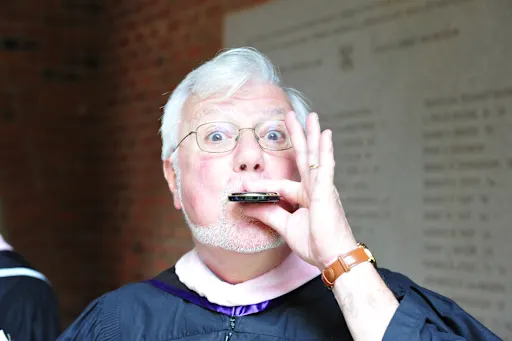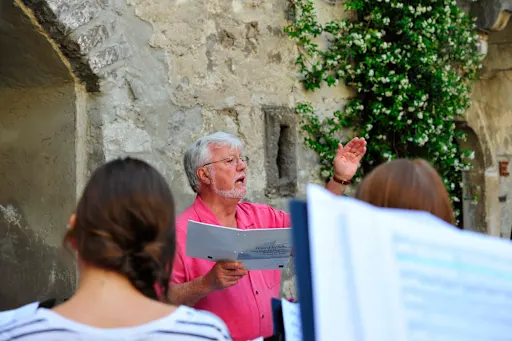On a freezing night in 1958, a tall, slender man wearing a tuxedo stepped out onto the stage in front of a sold-out audience in the Great Hall of the Moscow Conservatory. As the warm hum of conversation and applause came to a still, the young pianist began playing. This was the inaugural Tchaikovsky Competition, and the pianist who was about to perform was Van Cliburn, a rising 23-year-old pianist from a small town in rural Texas.
 It must have seemed strange to the audience that someone of his background would venture into the Soviet Union during the peak of the Cold War, and dare to perform a piece written by Rachmaninoff, a Russian composer. Yet, despite all expectations, more than forty minutes after the start of his performance, Cliburn began playing the final coda of Rachmaninoff’s Piano Concerto No. 3. With aching fingers and his hair soaked with sweat, Cliburn struck notes and melodies that resonated through the hall, enraptured by those gorgeous chordal repetitions. And without even realizing it, after striking those final notes, Van Cliburn — an American in front of Khruschev — immediately and trance-like gets up from his bench to kiss Kiril Kondrashin, the conductor. Needless to say, Cliburn won gold. Audiences were transfixed, judges were stunned, and millions around the world read about this incredible performance. And among those millions was a young boy in Pennsylvania named Bruce Fifer.
It must have seemed strange to the audience that someone of his background would venture into the Soviet Union during the peak of the Cold War, and dare to perform a piece written by Rachmaninoff, a Russian composer. Yet, despite all expectations, more than forty minutes after the start of his performance, Cliburn began playing the final coda of Rachmaninoff’s Piano Concerto No. 3. With aching fingers and his hair soaked with sweat, Cliburn struck notes and melodies that resonated through the hall, enraptured by those gorgeous chordal repetitions. And without even realizing it, after striking those final notes, Van Cliburn — an American in front of Khruschev — immediately and trance-like gets up from his bench to kiss Kiril Kondrashin, the conductor. Needless to say, Cliburn won gold. Audiences were transfixed, judges were stunned, and millions around the world read about this incredible performance. And among those millions was a young boy in Pennsylvania named Bruce Fifer.
From even his earliest days, Mr. Fifer grew up loving music; both of his parents were part of the church choir in Wyncote, Pennsylvania, his hometown. They brought classical music home to him, and he remembers spending hours of his day listening to the church organist play. In sixth grade, Mr. Fifer and his mother were given tickets to the Bach B Minor Mass, a work that blended Catholic tradition, Baroque technique, and international musical styles. “We went, and I was blown away by it.” Another one of the greatest inspirations to the young Mr. Fifer was reading about Van Cliburn’s victory in the Tchaikovsky Competition — a young Texan winning a Russian music competition at the height of the Cold War was simply extraordinary. This was a moment that would carry itself throughout Mr. Fifer’s life as he forged his love for music in myriad ways.
Mr. Fifer’s musical and choral accomplishments are so vast that we find it staggeringly challenging to fit them into a single article. From singing on the soundtracks of Beauty and the Beast to touring Collegium around the world, Mr. Fifer has done virtually everything and anything remotely related to choral music. His career can roughly be divided into three chapters: his direction at the choral program at the Cathedral of St. John the Divine in New York City, his enduring choral recording and performance career, and his time leading Collegium Musicum at Taft.
In the 1980s, after a rich music upbringing and graduating from Westminster Choir College, Mr. Fifer started his 22-year-long journey at the Cathedral of St. John the Divine in New York, first as assistant and eventually as director of liturgical drama and music. Within the Gothic revival facades and buttresses of the church, Mr. Fifer led the creation of everything from a staged version of Bach’s St. John Passion to annual performances of the Messiah, in addition to countless choral performances for larger audiences. “The building’s cavernous acoustics have defeated many a musical performance over the years,” one reporter noted in a review from The New York Times, “but Mr. Fifer, the cathedral’s director of liturgical music, turned them to superb dramatic use here with his varied placements.”
Outside of leading and conducting choirs, Mr. Fifer has had extensive solo experience in performing. He can be heard on the soundtracks of classic Disney movies such as Beauty and the Beast, Aladdin, Pocahontas, The Hunchback of Notre Dame, and Mulan. Prior to even joining The Cathedral of St. John the Divine, Mr. Fifer led a 30-year career as a solo baritone, where he could be heard on live performances and recordings of virtually every choral ensemble in the New York metropolitan area. He has also performed with the finest symphony orchestras such as the New York Philharmonic under Leonard Bernstein; the Boston Symphony and the Buffalo Philharmonic under Michael Tilson Thomas; and the Philadelphia Orchestra and National Symphony.
 In 1996, Mr. Fifer joined Taft as the Director of Collegium Musicum. Having been familiarized with the boarding school environment (his daughter was already a student at St. Paul’s), Mr. Fifer was drawn to how integrated the music program was to life at Taft. “What was attractive to me was that it wasn’t extracurricular… four times a week, they were mine to work with.” Since the start of his tenure, Mr. Fifer has conducted Collegium with an unwavering passion and irresistible personality in numerous performances each year, including on Family Weekend, Alumni Weekend, and, of course, the beloved Lessons and Carols held every December. Mr. Fifer has also ushered Collegium to perform beyond the halls of Taft and around the world in New York City, San Francisco, the Czech Republic, Great Britain, China, Spain, France, Austria, and Italy. To be able not only to teach, but also to inspire a class of 40 students of all identities and musical backgrounds is a true testament to how remarkable a maestro and pedagogue Mr. Fifer truly is. Head of School Emeritus Willy Macmullen ‘78 said it best: “When you combine excellence and humility in a teacher, it looks like Bruce… He has been the face of Taft arts for decades.” Beyond Collegium, Mr. Fifer also brought music to the Taft and Watertown communities through the “Music for a While” concert series in 1996, which to this day has invited world-class musicians to perform right at Taft’s campus.
In 1996, Mr. Fifer joined Taft as the Director of Collegium Musicum. Having been familiarized with the boarding school environment (his daughter was already a student at St. Paul’s), Mr. Fifer was drawn to how integrated the music program was to life at Taft. “What was attractive to me was that it wasn’t extracurricular… four times a week, they were mine to work with.” Since the start of his tenure, Mr. Fifer has conducted Collegium with an unwavering passion and irresistible personality in numerous performances each year, including on Family Weekend, Alumni Weekend, and, of course, the beloved Lessons and Carols held every December. Mr. Fifer has also ushered Collegium to perform beyond the halls of Taft and around the world in New York City, San Francisco, the Czech Republic, Great Britain, China, Spain, France, Austria, and Italy. To be able not only to teach, but also to inspire a class of 40 students of all identities and musical backgrounds is a true testament to how remarkable a maestro and pedagogue Mr. Fifer truly is. Head of School Emeritus Willy Macmullen ‘78 said it best: “When you combine excellence and humility in a teacher, it looks like Bruce… He has been the face of Taft arts for decades.” Beyond Collegium, Mr. Fifer also brought music to the Taft and Watertown communities through the “Music for a While” concert series in 1996, which to this day has invited world-class musicians to perform right at Taft’s campus.
As we wrote this piece, we found ourselves returning not just to Mr. Fifer’s numerous accomplishments, but also the small moments and memories that defined our experience with him. For me, Louisa, I have been so marked by our annual concerts in New York City and the pure joy radiating from Mr. Fifer. Throughout every song, he felt so deeply connected to every one of us, through eye contact and smiles. And for me, Steven, I can never forget playing the violin solo on Ola Gjeilo’s Serenity during the last service of Lessons and Carols of Mr. Fifer’s career. Between two of the sections I played, there was this moment of stillness where I stood, with my eyes closed, as the entirety of Collegium crescendoed behind me. I peeked open my eyes, and there I saw Mr. Fifer waving his hands with such effervescence and determination, his gaze full of passion, and his mouth uttering every single word the choir sang. When the singers behind me reached the climax of the piece — a chord that reverberated throughout Woodward Chapel — all the nervousness dissappeared and I knew that this moment would be something that I’d remember forever. Now, whenever I listen to the piece, I admit that I tear up a little thinking about that last performance — in that fleeting moment of music, we all created something that was much larger than ourselves.
From St. John the Divine to the intimate rehearsal spaces at Taft, Mr. Fifer’s story is one of devotion to music, education, and the countless people he has inspired. As he looks back on almost three decades of his career at Taft, Mr. Fifer realizes how much his wife, Mrs. Fifer, has truly been his “rock, enabler, and support.” “She’s always extraordinary, and I wish for everybody that you have a partner in life like her,” he says. Just as Mrs. Fifer has constantly supported his life, Collegium has also served as a guiding force. For him, Collegium is more than just a class. He sees it as “a life lesson… It’s something that is so important in this day and age when we really have to connect with music that’s beautiful.”
Mr. Fifer he begins to say goodbye to his students, he encourages them to continue singing beyond the classrom . “There’s a whole world out there,” he notes, “of like-minded people who love to get together and make music.” To that, his departure from Taft does not mean music will leave his life. He plans on joining a choir and revisiting programs from past performances in his career, and will certainly be seen at performances throughout the year. Although he will miss the close-knit Taft community and intimate connections between him and his students, Mr. Fifer will remain close, both physically and in our hearts. His years of teaching have left an indelible mark on his students and the Taft community at large, and his legacy will remain for long after his departure this May. Thank you, Mr. Fifer, for teaching us the joy of music — of how to savor every moment we have, no matter how ephemeral, whether as performer or audience. And as we sing our last notes with you, remember your voice will always be part of ours.